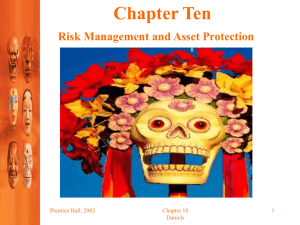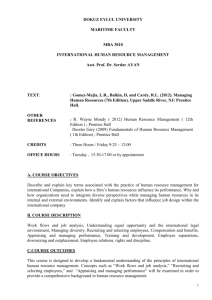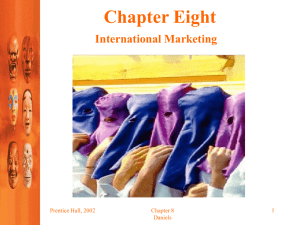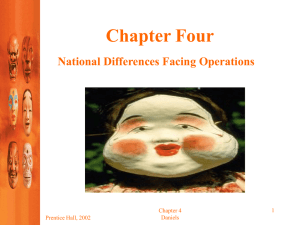Chapter 2
advertisement
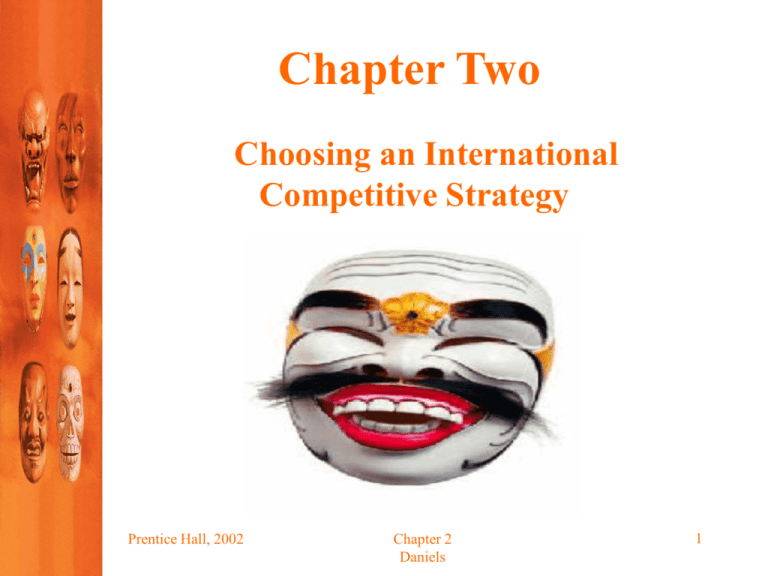
Chapter Two Choosing an International Competitive Strategy Prentice Hall, 2002 Chapter 2 Daniels 1 Chapter Objectives To understand the meaning of business strategy, especially in an international context To appreciate that well-conceived strategies improve performance To grasp the advantages of international operations that motivate managers to undertake them To discern the advantages of entering international markets via acquisitions versus new venturing To realize how multidomestic, global, and transnational strategies help companies fulfill international objectives Prentice Hall, 2002 Chapter 2 Daniels 2 Introduction Managers of companies must decide whether to exploit the limited resources domestically or internationally Opportunities may include sales to untapped markets or lower production costs Constraints include competition, national operating environments, and restrictions to moving goods, services, and assets among countries Companies’ strategies are the necessary linchpins to bring about successful operations in a globalizing economy Prentice Hall, 2002 Chapter 2 Daniels 3 Chapter Introduction Prentice Hall, 2002 Chapter 2 Daniels 4 The Concept of International Business Strategy Strategy: the specific group of decisions managers take to maximize their companies’ performance Mission: a guideline stating what the company seeks to do and become over the long term Strategic intent: consists of the goals that stretch the company’s performance credibly so that employees believe the goals can be reached and will work toward their achievement Objectives: specific performance targets Prentice Hall, 2002 Chapter 2 Daniels 5 Why Study International Business Strategy? The major reason for studying international business strategy is that some companies consistently perform better than others within their same industries Another reason is because managers often suboptimize their companies’ international performance • This occurs usually for three reasons: Risk-avoidance behavior Choosing locations that do not fit with a wellconceived strategy Failure to know how best to implement decisions in different foreign environments Prentice Hall, 2002 Chapter 2 Daniels 6 Why Study International Business Strategy? Risk-avoidance behavior • Managers often avoid excessive risk in international operations • • when they or their companies have little international experience Managers should make decisions for either domestic or international expansion based on a strategy that examines opportunities and risks realistically Nonfit with strategy • Locating in areas that do not fit with a well-conceived strategy can adversely affect performance The lack of fit is sometimes due to a bandwagon mentality Implementation problems • Managers may not have the know-how to best implement strategies in foreign environments Prentice Hall, 2002 Chapter 2 Daniels 7 Why Study International Business Strategy? Core competencies: those assets that are valuable for improving business, are difficult for competitors to imitate, and can be extended as a value-creating capability for use in other product or geographic markets Three basic groups include: Superior technological know-how Reliable innovative processes Close relationships with external parties Barriers to entry: those conditions that limit easy entry of new competitors into an industry • Usually classified as one of four types: Brand loyalty Absolute cost advantage High capital costs Government regulations Prentice Hall, 2002 Chapter 2 Daniels 8 Motives for Foreign Operations Sales expansion motives • Three factors often trigger companies to increase sales through international expansion: Maturity of their domestic markets a continuum that consists of four stages – introduction, growth, maturity, and decline Mature market: sales growth slows o Product life cycle: o Slower domestic than foreign growth rates o Companies may encounter differences in potential demand o o growth due to differences among countries in economic growth Triad market: United States, Japan, and Western Europe According to World Bank forecasts, China will surpass the United States as the world’s largest economy by the year 2020 Ability to gain product capabilities o Managers seek foreign product capabilities for which they can use core competencies to expand domestic sales Prentice Hall, 2002 Chapter 2 Daniels 9 Motives for Foreign Operations Cost reduction motives: • Cost minimization is essential for companies that compete primarily on the basis of price • Companies’ international expansion may reduce their costs by 1) spreading their fixed expenses, 2) by enabling them to produce with cheaper inputs or in cheaper operating locations, and 3) by achieving vertical integration • Experience curve: cutting costs by 20-30% each time output doubles Rationalized production: (global supply chain) depending on different countries for supplies of the different components or products in their lines Prentice Hall, 2002 Chapter 2 Daniels 10 Motives for Foreign Operations Value chain integration: • Value chain: the linked activities that transform inputs into the outputs that eventually reach end customers Backward integration: adding a link away from the end customer Forward integration: adding a link toward the end customer Three possible cost advantages of value chain integration are: • Saving transaction costs • Building bargaining power with suppliers or customers • Minimizing stock-out and overcapacity costs Prentice Hall, 2002 Chapter 2 Daniels 11 Motives for Foreign Operations Prentice Hall, 2002 Chapter 2 Daniels 12 Motives for Foreign Operations Risk-reduction motives: • Smoothing sales and profits To minimize swings in sales and profits, managers may seek out foreign markets because the timing of business cycles differs among countries Lessening dependence on existing customers and suppliers By increasing its number of suppliers, a company becomes less vulnerable in supply shortages • Preventing competitors’ advantage Oligopolistic industries: those with few sellers Prentice Hall, 2002 Chapter 2 Daniels 13 Acquisitions Versus New Venturing Acquisitions: include buying other companies in whole or in part and buying capabilities from other companies • A company gets a known product or process, thus reducing the risk from internal development • Cost savings • Faster results New venturing: includes new products or processes from the companies’ own R & D, hiring of personnel with expertise, and building new facilities Prentice Hall, 2002 Chapter 2 Daniels 14 Implementation Strategies Regardless of the motive for international expansion, a company must have a strategy for fulfilling its motives • Multidomestic: the company allows each of its foreign-country operations to act fairly independently • Global: the company integrates its operations that are located in different countries • Transnational: the company develops different capabilities and contributions from different countries and shares them in integrated worldwide operations Prentice Hall, 2002 Chapter 2 Daniels 15 A Mix of Strategies Different products, capabilities, and operating locations dictate a mix of approaches to maximize performance Avon’s International Activities Prentice Hall, 2002 Chapter 2 Daniels 16 Operational Decisions The choice of whether to use multidomestic, global, or transnational strategy interrelates with a number of operational decisions The alternatives that companies face include: • • • • • • • • Location of value-added activities Location of sales target Level of involvement Product and services strategy Marketing Production strategy Competitive moves Factor movements and start-up strategy Prentice Hall, 2002 Chapter 2 Daniels 17

